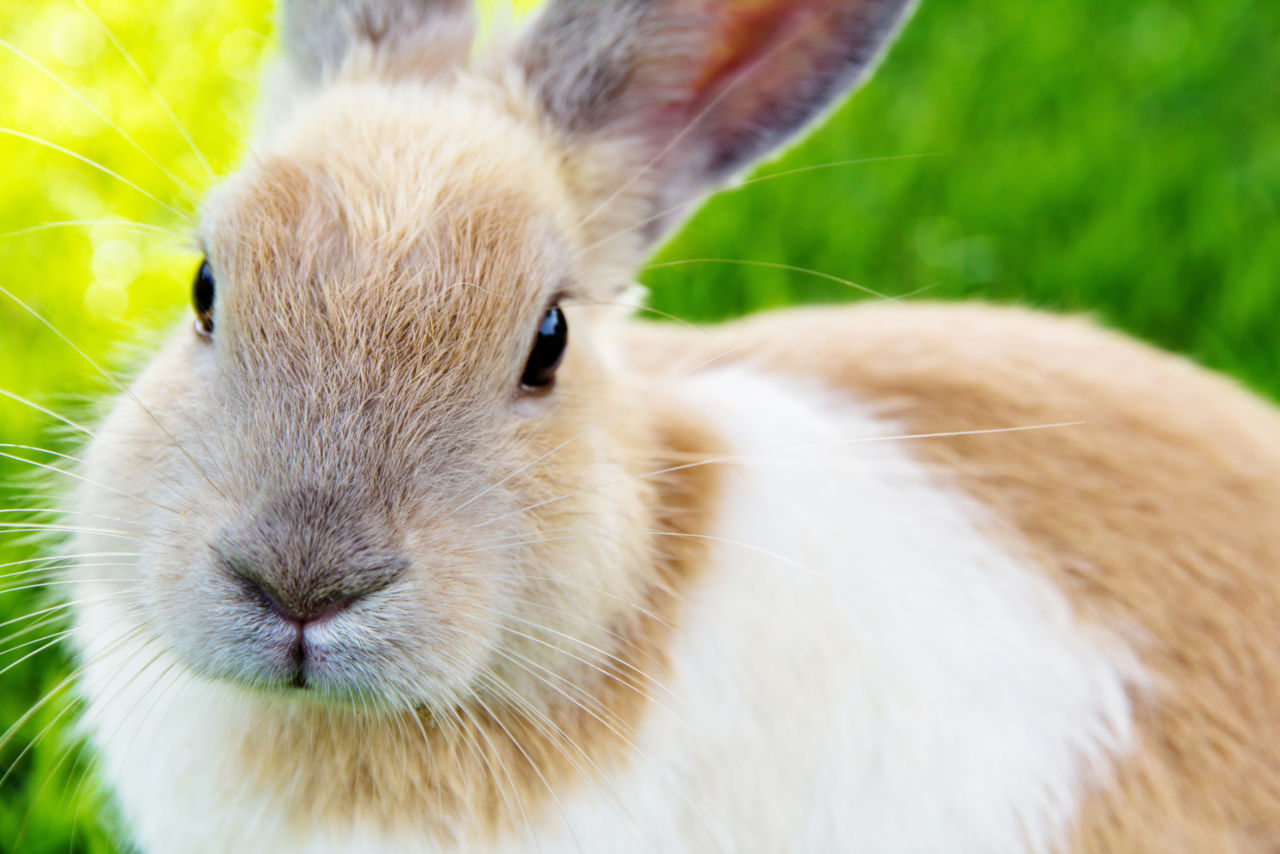Mint can be found in many supermarket fruit and vegetable sections. It can be found among other healthy vegetables that are good for rabbits. If you’ve ever wondered whether you can feed mint to rabbits, we have good news for you. You can give all parts of the mint plant to your rabbits.
Mint is a healthy herb that you can feed to rabbits in small quantities. It is not only tasty but also has many health benefits. Rabbits can eat all parts of the mint plant, including the leaves and stems. Although the roots are not poisonous, they are not very nutritious either. If you feed mint to rabbits, you should only offer the leaves, flowers, and stems.
Mint is not only a nutritious component of rabbit food but also a plant with medicinal properties.
Mint can be fed to rabbits with digestive problems and rabbits in the weaning phase to prevent mastitis.
Can Rabbits Eat Mint?
The term mint can refer to many types of plants. Most of these mint plants belong to the genus Mentha, which also includes plants such as spearmint (Mentha spicata) and peppermint (Mentha x piperita).
Other plants colloquially referred to as mint belong to the more prominent family Lamiaceae, which includes the genus Mentha.
This more prominent family includes herbs such as thyme, lemon balm, sage, and basil.
All types of mint are safe for rabbits, except for pennyroyal.
You can give your rabbits all parts of the safe mint plants. However, the root is not a good source of nutrients.
Can Rabbits Eat Mint Leaves?
The mint leaf is the tastiest and most aromatic part of the mint plant, where most of the plant’s oil is stored. In cooking, the mint leaves add flavor and aroma to a dish.
For rabbits, the leaves of the mint plant are a true goldmine of health benefits and flavorings.
To get the best flavor and medicinal properties from mint leaves, harvest them just before they flower.
This is when the mint contains the most significant amount of oil, which enhances its therapeutic properties and flavor.
Can Rabbits Eat Mint Flowers?
All mint plants usually have small flowers arranged in clusters. Depending on the variety, the flowers may be white, purple, or pink.
Like the leaves, mint flowers are also very aromatic, although they have a more fruity flavor than the leaves.
Just like the leaves, mint blossoms are also safe for rabbits. This makes mint blossoms an alternative for rabbits that find the mint flavor too strong.
Can Rabbits Eat Mint Stems?
Mint stems are usually not used in human dishes. The more tasty leaves are usually preferred as a spice in food.
However, mint stems have the same spicy, minty taste as the leaves.
The stems near the leaves and shoots’ tops are the tenderest part of the stem. But if your rabbits have no difficulty chewing the whole stem, you can give them the entire stem.
Can Rabbits Eat Mint Root?
Although mint root is not poisonous to rabbits, it is not nutritious either. Unlike many other plants, mint roots have no nutritional value.
With mint plants, it is, therefore, better to use only the green leaves and stems.
Which Types of Mint Are Poisonous to Rabbits?
Most plants from the mint family are harmless to rabbits. However, some plants are considered poisonous, such as pennyroyal (Mentha pulegium), also known as mosquito plants.
In the past, spearmint was used as a household remedy for digestive problems and liver and gallbladder complaints.
As it is now known that the plant has a liver-damaging effect, among other things, it is no longer used today.
Polei mint can also be very dangerous for rabbits and can even lead to death.
So, if you want to collect your own mint in the wild, you should know the difference.
Identification of pennyroyal
Pennyroyal is most easily identified by its flowers, which are a striking purple color.
Unfortunately, pennyroyal has leaves that resemble those of non-poisonous mint. They also have a minty smell when crushed, comparable to other mint family plants.
Healthy Mint Plants for Rabbits
Apart from pennyroyal, you can safely feed your rabbit plants from the mint family. Some of the mint relatives mentioned above are also suitable for rabbits.
Lemon Balm
The lemon balm (Melissa officianalis) is a small plant that grows to a height of between 28 and 60 inches (70 and 150 cm). It not only helps with digestive problems but can also relieve stress.
Peppermint
Peppermint is a hybrid of spearmint (Mentha spicata) and water mint (Mentha aquatica). It grows to a height of between 10 and 35 inches (30 and 90 cm).
It has long, broad, and slightly downy leaves with reddish veins and blooms with purple whorls of flowers.
Peppermint contains a high content of natural pesticides and is, therefore, commonly used to repel rodents in organic gardening.
Peppermint not only aids digestion but can also be used against flatulence in rabbits.
Rosemary
Rosemary (Salvia romarinus) is a plant known for its needle-like leaves. It blooms with white, pink, purple, or blue flowers.
Apart from being a tasty treat both dried and as a tea, rosemary has many health benefits for rabbits.
Rosemary can aid digestion and circulation in rabbits and helps against weakness and depression.
Lavender
This small shrub is known for its relaxing aroma and unusual scent.
In rabbits, lavender (Lavandula) stimulates appetite, relieves pain, stimulates circulation, and reduces flatulence.
Can Rabbits Drink Mint Tea?
To give your rabbits mint, you can simply brew tea and allow it to cool. Do not add other ingredients, as these can be dangerous for rabbits.
If you don’t have mint, you can also brew tea from a tea bag. Just make sure it is only filled with mint leaves and nothing else.
Once the tea has cooled down, serve it to your rabbits in a bowl. On colder days, you can also serve the tea slightly warmed.
While peppermint tea is an excellent drink for your rabbits, some may prefer plain water, even if they don’t mind the leaves.
Health Benefits of Mint for Rabbits
Not only does mint taste good, but it also has a lot of health benefits. Here are some of the health benefits rabbits can get from mint:
- Balanced diet: The mint plants are high in fiber and low in sugar and calories. These are three essential points that make up a balanced rabbit diet.
- Vitamins: Mint contains vitamins A, C, and various B vitamins.
- Antioxidants: Most herbs are known to be an excellent source of antioxidants, and mint is no different. Antioxidants prevent various diseases, such as arthritis, memory loss, and even cancer.
- Minerals: Mint is also rich in iron, calcium, phosphorus, manganese, copper, magnesium, and zinc.
Mint As a Remedy
Besides its health benefits, mint can also be used as a remedy for illnesses.
Mint has long been used as a home remedy. And scientists have found in studies that these folk remedies have merit.
In fact, these traditional uses are still practiced in various parts of the world today.
Even in rabbits, mint is known to help with various ailments. Here are some ways you can use mint as a medicine for rabbits:
- Digestive ailments: The high fiber content of mint plants can help with indigestion in rabbits. Mint is a common remedy for rabbits whose digestive tract is blocked.
- Soft stools: Mint can help rabbits that have soft or watery stools.
- Flatulence: Although it is a normal bodily function, excessive flatulence can be painful. Fortunately, mint has proven to be an effective remedy for bloating and other digestive problems.
- Brain power: Due to the nutrients and minerals contained in mint, mint is believed to help improve brain power.
- Stress: The plants lemon balm and lavender, in particular, are known to reduce stress and also have antibacterial and antiviral effects.
Can Nursing Rabbits Be Given Mint?
It would be best not to feed mint plants to nursing rabbits. It is known that mint dries out the milk of rabbits.
Suckling rabbits should also not eat parsley, sage, and other herbs from the labiate family.
On the other hand, this effect can also be utilized. This effect of mint can be helpful for animals that are weaning their young.
Weaning rabbits have a higher risk of developing mastitis, but the mint plants’ milk-drying effect can prevent this disease.
How to Serve Your Rabbit Mint
You can simply feed raw mint to your rabbits. However, it would help if you prepared the plant a little. Here are some ways to make mint healthier and safer:
- Wash the mint: Supermarket-bought mint may have been sprayed with chemicals. If you haven’t grown the mint yourself, it’s best to rinse it thoroughly under running water.
- Chop up the mint: So that the taste is not too strong for your rabbits, chop up the leaves into small pieces and sprinkle them over the rest of the food.
- Mix them: Dried herbs can be too potent in taste for rabbits. Dried mint herbs are more suitable for feeding your rabbits, which you sprinkle over moist vegetables and hay.
What to Do if Rabbits Have Overeaten Mint?
While mint is a great food plant for your rabbits, it is also possible for them to overeat it.
Mint and other herbs should not comprise most of your rabbit’s diet. Instead, rabbits should be fed mainly hay, vegetables, and fruit only as supplements or occasional treats.
How can you tell if your rabbit has overeaten mint? Look out for the following symptoms:
- Painful bowel movements
- Straining to defecate
- Discolored or oddly shaped stools
- Loss of appetite
When you observe any of these symptoms, decrease the vegetables you feed your rabbit. Then, make an appointment with your vet.
Do Rabbits Like Mint?
Some rabbits don’t like the smell or find the taste too strong. In most cases, owners report that their rabbits like the plant.
However, some rabbits take a while to get used to the plant. However, most eventually learn to love its smell and taste.
If you want to feed mint to a rabbit that is skeptical of it, there are a few things you can do to increase your chances.
Here are a few ideas on how to convince your rabbits to eat mint:
- Introduce the herb: Some rabbits like to explore their food before they eat it. If your rabbits have never seen mint before, let them smell the plant before feeding. Your rabbits may not like it at first and ignore it. Over time, some rabbits may nibble on it.
- Start slowly: Like most herbs, you should give mint in small amounts, primarily when you first feed it to your rabbits. This way, you can determine what amount of mint is healthy for your rabbits and avoid overfeeding.
- Use mint blossoms: Mint blossoms have a less intense taste than the leaves. The pungency is somewhat replaced by fruitiness. If a rabbit won’t eat the mint because of its taste, offer it mint flowers.
- Let them explore: Letting your rabbits explore on their own will help you find out if they like mint or not. Your rabbits may like mint, but not the variety you give them. If left to their own devices, rabbits can choose for themselves which leaves they like best.
If you’ve done everything you can to feed your rabbits mint and haven’t had success, don’t force your rabbits.
What one rabbit likes, another may not. With persistence, you will discover your rabbits’ preferences and set them on the path to a healthier and happier life.


